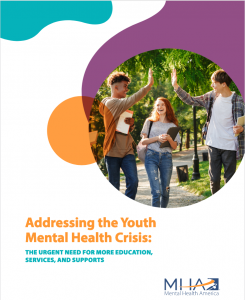Addressing The Youth Mental Health Crisis: The Urgent Need For More Education, Services, And Supports [downloadable]
 Indicators of youth mental health and well-being indicate a growing public health crisis that has only been worsened by COVID-19. This report seeks to document the alarming trends in youth mental health and the disparities in access to care. The report then addresses several innovative state legislative solutions to promote school-based mental health education, supports, and services. The report also highlights the effect of these policies on advancing equity and the role of youth leadership in securing legislation. The information is designed to guide advocacy at the state level and begin to create a framework for federal policy.
Indicators of youth mental health and well-being indicate a growing public health crisis that has only been worsened by COVID-19. This report seeks to document the alarming trends in youth mental health and the disparities in access to care. The report then addresses several innovative state legislative solutions to promote school-based mental health education, supports, and services. The report also highlights the effect of these policies on advancing equity and the role of youth leadership in securing legislation. The information is designed to guide advocacy at the state level and begin to create a framework for federal policy.
Executive Summary
YOUTH MENTAL HEALTH IS WORSENING, AND DISPARITIES ARE PERSISTING
In 2019, data from the National Survey on Drug Use and Health indicated that the percentage of youth ages 12-17 who reported experiencing a past-year major depressive episode (MDE) had doubled over the past decade. Disparities continue, and Black and Latinx children are less likely than white youth to receive treatment for their depression, including inpatient treatment, though they are no less likely to have a major depressive disorder.
COVID-19 worsened these alarming trends among youth and adolescents. From March to October of 2020, CDC data indicates children’s visits to the emergency room for mental health conditions increased significantly. COVID-19 also revealed ongoing disparities. Mental Health America’s online screening data indicates that youth ages 11-17 who identified as Native American or American Indian and those who identified as multiracial had the highest rates of depression. The largest increases in the proportion of youth experiencing suicidal ideation between 2019 and 2020 were for Black or African American screeners and Hispanic or Latinx screeners.
STATES HAVE ENACTED POLICIES REQUIRING MENTAL HEALTH EDUCATION, SERVICES, AND SUPPORTS THROUGH EXCUSED ABSENCES FOR MENTAL HEALTH
Schools are a critical setting for mental health policy. States have enacted policies, but the vast majority of states lack comprehensive policies in at least one category, and additional policies are needed to effectively address youth mental health needs.
Mental Health Education:
New York led the way with the nation’s first statute requiring K-12 mental health education. Virginia soon followed with a legislative requirement for high school students. Florida enacted rules that require every Florida public school to provide students in grades 6-12 with at least five hours of mental health instruction. Mental health education is designed to address the gap of 11 years between symptoms and treatment by educating students to help themselves and their friends. Social-emotional learning interventions have been proven to promote well-being and academic achievement.
Mental Health Services:
Access to mental health services begins with early intervention by school personnel. Some states have enacted and funded lower ratios of counselors and social workers to students to improve the number of health professionals in schools. Only 14 states have fully expanded Medicaid to cover services outside of those detailed in an Individualized Education Plan (IEP), though several others are in progress. Very few children have an IEP.
In addition to reimbursing for school personnel, some states have enacted programs to promote community-based mental health providers delivering services in schools. Minnesota and Kansas have effective programs encouraging school-based services by community providers with strong outcomes. These programs are particularly helpful in addressing inequity, and data indicates that students of color gain access to mental health care when treatment is provided at school. Given workforce shortages, telehealth is particularly helpful in a school setting, and approximately half the states have specified that schools are eligible sites of service under their Medicaid programs.
Excused Absences for Mental Health:
Students need support when they are feeling unwell and unable to attend school for mental health as well as physical health reasons. Oregon’s legislature passed the first bill in 2019, amending the excused school absence policy to include mental and behavioral health as a valid reason for an excused absence. Other states that have passed legislation regarding excused absences for mental/behavioral health include Colorado, Maine, Utah, Connecticut, and Virginia.
YOUTH LEADERSHIP HAS PLAYED A KEY ROLE IN DEVELOPING AND PASSING LEGISLATION
Youth in Oregon led the effort to enact excused absences for mental health with assistance from lobbyists for Providence Health and Services. Youth leaders were responsible for the Virginia education law. They drafted the statute, secured a prominent sponsor, and advocated for passage of the bill. Youth in New York received training in their government class and advocated for mental health education in schools by reaching out to their legislators and telling their stories.
Recommendations for the Future
1. Promote Youth Leadership at the Local, State, and National Levels to Improve Youth Mental Health in Schools
Youth leaders have driven changes in state policies affecting youth mental health and schools. Partners have supported these efforts by providing training and assistance in accessing the levers of government to achieve policy changes. The next phase of work should include mobilizing more youth across the country to advocate for change and supporting their initiatives and leadership.
2. Advocate for and Achieve More State Legislative Victories in Key Areas of Mental Health Education, Access to Services, and Mental Health Excused Absences; and Ensure Follow-up, Evaluation, and Effective Implementation
Although there has been innovation in the states, many of these initiatives have only spread to a few states. Advocates should carefully review their policies and build on existing structures for greater impact. Most states have significant gaps in policy regarding school-based mental health, and additional policies are needed to comprehensively address youth mental health needs, so there is much work to be done. In addition, advocates need to follow up and ensure evaluation and implementation even in states that have policies.
3. Continue Innovation and Research on Evolving State Statutes and Programs to Improve Early Intervention in Youth Mental Health, Particularly in the Areas of Screening and Peer Support
Similar to physical conditions, mental health conditions are easier to treat early. Two areas of state innovation that can be helpful in ensuring intervention at the beginning of a mental health condition are screening and peer support. Youth are interested in screening for mental health conditions, especially during the pandemic, and are more likely to talk to a friend than anyone else when experiencing mental health symptoms. Some states have begun to consider these policies, and further research in these areas is needed.
4. Draw on State Experiences to Inform a National Strategy and Implementation to Improve Youth Mental Health with an Emphasis on Youth Leadership, Equity, and School Initiatives
This report is limited to state policy, but the alarming trends in youth mental health are a national crisis and require a national strategy across and within agencies. The federal government needs to learn from the state initiatives profiled in this report and develop a national strategy, specific goals, a data collection process for measuring progress, and a specific implementation plan across agencies to improve youth mental health and promote equitable outcomes for LGBTQ+ and BIPOC youth, especially in schools. Specific agencies also need to prioritize youth mental health, coordinate to promote mental health education and services, and support and incorporate youth leadership.
Conclusion
With youth mental health declining and worsening during COVID-19, more urgency is needed at the local, state, and national levels. The efforts highlighted here should be enacted in communities and across states, and policy initiatives led by youth must be further developed at all levels of government.
Excerpted from “Addressing The Youth Mental Health Crisis: The Urgent Need For More Education, Services, And Supports” on the Mental Health America website. You may read the full report online or download a PDF.
Source: Mental Health America | Addressing The Youth Mental Health Crisis: The Urgent Need For More Education, Services, And Supports, https://mhanational.org/addressing-youth-mental-health-crisis-urgent-need-more-education-services-and-supports | © Copyright 2021 Mental Health America, Inc.
A screening can help you determine if you or someone you care about should contact a mental health professional. Care Managers can arrange a free 30-minute Care Consultation so you can explore options with an expert. Call or email our Care Managers at 650.688.3625 or careteam@chconline.org to set up an initial Consultation appointment.





